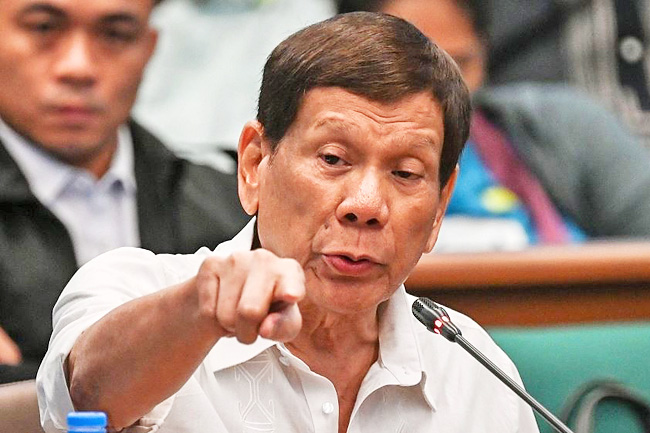ANN/THE STRAITS TIMES – For nine hours on October 28, it appeared as though the irreverent Rodrigo Duterte was back in the commander’s seat.
The former Philippine president returned to the national spotlight for the first time since his six-year term ended in 2022, as he faced a Senate committee investigating the bloody drug war he waged that left thousands dead at the hands of police officers and vigilantes, often without proof they were linked to drugs.
The police say that over 6,000 drug suspects were killed, but human rights groups claim the death toll is double that.
Brash and unapologetic, as is his wont, Duterte admitted at the hearing that during his term as president, he had ordered the police to encourage drug suspects to fight back so officers could justify killing them.
He said it was the same instructions he gave to his assembled “death squad” that targeted drug suspects during his 22 years as mayor of the southern city of Davao, before he became president in 2016. Duterte has said in the past that he had patterned the “war on drugs” on the controversial anti-drugs campaign he first ran on his home turf.

“Do not question my policies because I offer no apologies, no excuses. I did what I had to do, and whether or not you believe it, I did it for my country,” said Duterte in an expletives-filled testimony that began at 10am.
To critics like respected human rights lawyer Chel Diokno, the former president made “damning” admissions that the International Criminal Court (ICC) can now use to beef up its ongoing crimes against humanity probe against Duterte.
The Senate and ICC are conducting investigations into the allegations of state-sanctioned killings during the Philippines’ crackdown on drugs.
But political analysts believe what the televised Senate hearing mostly achieved was to give Duterte a stage to flex anew his political muscle, as his once-ruling dynastic clan struggles for relevance amid the heated feud with their erstwhile ally, President Ferdinand Marcos Jr.
Duterte’s daughter, Vice-President Sara Duterte, has been verbally attacking Marcos in recent weeks, calling him out for winning the presidency in 2022 without a clear platform and even saying he is unfit to be president. The Marcos-Duterte ticket secured a landslide victory at the presidential election in 2022, riding on a promise to unite the nation – a unity that has now clearly crumbled.
“He (Duterte) went to the Senate and said all those things that shocked everyone. He behaved like a tough guy on the streets, and showed his supporters that he is still that alpha dog that can still dominate in an official setting,” senior research fellow Michael Yusingco of Manila-based think-tank Ateneo Policy Centre told The Straits Times. “The senators played into Duterte’s hand.”
In the Philippines, people giving testimony at senatorial hearings are generally not accorded such leeway to express themselves. Rather, those being investigated for alleged wrongdoing tend to be on their best behaviour while in the hot seat. For instance, embattled former mayor Alice Guo was grilled by senators in September amid ongoing investigations into her alleged ties to foreign crime syndicates.
Yet Duterte was allowed to carry on with his crass behaviour. Three senators allied with the former president even defended the drug war during the hearing and tried to pass off some of his statements as mere jokes.
Only opposition senator Risa Hontiveros questioned Duterte sternly and had a heated exchange with him at one point during the hearing.
But it was not surprising that the Senate acted that way, said political analyst and visiting senior fellow at the ISEAS – Yusof Ishak Institute Aries Arugay. With the midterm election season kicking off in October as candidates registered their candidacies, it was natural for the senators to make political calculations to safeguard their interests, Dr Arugay said.
Duterte himself signalled plans to run for mayor of Davao, the family stronghold, in the midterm polls in May 2025.
“A lot of these senators are running for re-election in 2025 and are trying to court the Duterte base,” Dr Arugay said. “At the end of the hearing, the Senate revealed the quality of its membership – or the lack of it. The Senate lost credibility here.”
Dr Arugay added that Duterte’s appearance was sending a message to supporters that his daughter, the vice-president, is not alone in her spat with Marcos.
While local surveys show a decline in the approval and trust ratings for Marcos and Ms Duterte amid their feud these past months, the vice-president still consistently gets higher ratings than the president.
All eyes are now on whether the Marcos administration will start its own drug war investigation based on Duterte’s latest statements.
To launch a probe would mean Marcos losing the support of Filipino voters who still back the Dutertes, said Yusingco. To leave the investigation to the ICC, meanwhile, would be a sign of weakness of the Philippine justice system.
Despite his feud with the Dutertes, President Marcos in May maintained the ICC has no jurisdiction over the Philippines and said he would not hand over his predecessor should an arrest warrant be issued.
“So President Marcos is in a bind now because he has to do something. He cannot sit on the fence this time,” said Yusingco.
“But he has to choose now. It’s a difficult choice,” he added.




